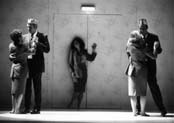BÚSQUEDA DE ÓPERA
Refine Search

Foto: Frank Heller
Theater Aachen, 2002, Director: Klaus Guth
Oehring, Helmut
BlauWaldDorf weit-aus-ein-ander liegende Tage
(BlueWoodVillage distantly apart days) (2001)eine musikaltheatralische OrtSuche (a music-theatre search of a place)
Duración: 70 minutos
Texto Musical
Based on texts by Hans Christian Andersen and Helmut Oehring as well as from Friedrich Schiller's 'Die Jungfrau von Orleans', Monteverdi and Rinuccini's 'Lamento d'Arianna', Thomas More's 'Utopia', Johann Sebastian Bach's BWV 21 and Psalm 69 (G)
Orquestación
3 deaf female soloists,Bar,B; chorus;
solo elec.gtr-1.1.2.bcl.0-3.3.3(III=dbtrbn)-perc(3)-prepared pft(=cel,kbd sampler)-strings(8.4.6.4.3)-live electronics
Abreviaturas (PDF)
Publicador
Bote & Bock
Territorio
Este trabajo está disponible a través de Boosey & Hawkes
para el mundo.
Disponibilidad
Estreno mundial
27/04/2002Theater Aachen, Aachen
Claus Guth, director
Director: Jeremy Hulin
Compañía: Theater Aachen
Ánimos
Poetic
Temas
